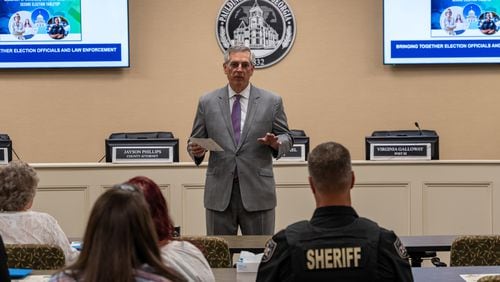U.S. Sen. David Perdue got where he is by successfully maneuvering through the hallways of the corporate world. His press releases even note that he is “the only Fortune 500 CEO in Congress.”
But don’t expect him to power lunch with the honchos in the U.S. Capitol any time soon.
fter the failure of Graham-Cassidy, the latest effort to repeal and replace Obamacare, Perdue blamed the setback squarely on Republican leadership.
“What happened today in Washington was a failure. … There is a complete lack of congressional leadership and no accountability to get results,” Georgia’s junior senator said in a press release Tuesday. “From the get go, three Republican Senate chairmen failed to support our efforts to repeal and replace Obamacare as we have all promised to do.”
Those chairmen apparently are Republican U.S. Sens. John McCain of Arizona, Susan Collins of Maine and Lisa Murkowski of Alaska. McCain heads the Senate Armed Services Committee, Collins is in charge of a special committee on aging, and Murkowski leads the Senate Energy and Natural Resources Committee.
McCain and Collins announced they would not support Graham-Cassidy before Senate Majority Leader Mitch McConnell, R-Ky., pulled it from the floor, denying it a vote. Murkowski announced her opposition after McConnell acted.
Perdue’s verbal assault also appears directed at McConnell for not using chairmanships to ensure the GOP caucus falls in line behind him.
- Rates on the rise: In Georgia, the Obamacare market appears a bit shaky, after state Insurance Commissioner Ralph Hudgens approved premium increases of more than 50 percent for the four insurers who will still participate in the state's health care exchanges next year.
Who to blame seems to be the argument.
Hudgens, a longtime opponent of Obamacare, puts it on the program.
The insurance companies, though, fault Congress for nine months of chaos over how to shape the nation’s health care policy.
The four insurers — Alliant, Ambetter, Blue Cross Blue Shield of Georgia and Kaiser — say that if Washington would assure them that cost subsidies would continue, the rate increases could be as little as 25 percentage points.
Nearly 500,000 Georgians signed up for coverage this year in the state’s exchange, which serves individuals and families who don’t have job-based or government coverage.
- Home and away games: It's just difficult to hold some conversations at home.
Earlier this week, The Atlanta Journal-Constitution reached out to candidates for statewide office for their opinions on President Donald Trump's criticism of pro football players for kneeling during the national anthem to bring attention to police brutality. Stacey Abrams' campaign declined to comment.
But the Democrat, while in California raising money in her bid for governor, found time to share her feelings on the subject with 49ers fans.
“Protest is necessary in America. It is part of our responsibility,” Abrams told a San Francisco Chronicle reporter. “And as long as that protest is peaceful and civil, it should be allowed to happen because that is how we make change in our country.”
She added: “I would say that any leader worth his or her salt would celebrate this moment because it is exactly who we are – it is always been who we are.”
Candidates who did respond to the AJC's request tended to break along party lines.
There isn’t space here for all of them, but here’s a sample:
Former state Sen. Hunter Hill, a combat veteran and GOP candidate for governor, said protests are an affront to the men and women in the military who deserve respect and not “political stunts.”
“The least we can do is salute the flag they carry and stand for the anthem that honors their sacrifice,” Hill said.
Former state Rep. Stacey Evans, Abrams’ opponent for the Democratic nomination for governor, said the diversity of opinions is part of what makes the nation exceptional.
“You honor the flag and the country it stands for when you salute, but also when you kneel,” she said. “Because enmeshed in its fibers is the right to free speech, to expression, and to stand up for what you believe in. And sometimes, to kneel for it as well.”
- Social media breakthrough: Compromise and Facebook aren't a natural fit, but state Rep. Jason Spencer, R-Woodbine, and former Atlanta Democratic state Rep. LaDawn Jones may change that.
The two, who recently made news for their social media exchanges about what to do with Confederate monuments (Spencer, notably, warned Jones that she could "go missing" in the Okefenokee Swamp if she pressed for removal of Rebel statues in South Georgia), have turned their battleground into common ground.
During a meeting Wednesday, they brokered a deal on a proposal to allow local communities to decide whether Civil War monuments should remain on their grounds, changing a provision in state law that makes it illegal to “relocate, remove, conceal or obscure” any Confederate memorial.
It also would set up Stone Mountain, the sprawling state-owned monument to Confederate war dead, as a repository for the Civil War statues that communities decide they don’t want. The mountain would also lose its standing as a “Confederate memorial” under state law, receiving new designation as “a historical memorial to Georgia’s role during the Civil War era.”
- Candidates, endorsements, etc.:
— House Democrats have broken new ground — or, at least, they're tilling long neglected soil — by recruiting a candidate for all seven of the special elections scheduled in November to fill vacant legislative seats. Party leaders believe this is the first time since legislative districts were redrawn in 2012 that Democrats have a candidate in the Republican-leaning districts that are/were represented by Bruce Broadrick in Dalton, Geoff Duncan in Cumming, Regina Quick in Athens and Chuck Williams in Watkinsville.
— Sarah Riggs Amico, an auto executive and political newcomer, has filed paperwork to join the lieutenant governor's race, becoming the first Democrat in the hunt for Georgia's No. 2 job. She joins three Republicans in the race: state Senate Pro Tem David Shafer, state Sen. Rick Jeffares and Duncan.
— Former Democratic U.S. Rep. John Barrow's decision to run has drawn new attention to the race for Georgia's secretary of state. Former Rockdale County Tax Commissioner R.J. Hadley, also a Democrat, said he was under pressure to drop out but decided that by running, he could add to his legacy. "I'm an outsider, long-shot guy anyway," he said. "Just adds to the legend."
— Bill Fielder, who bills himself as a "pro-Trump business turnaround CEO," may be a political newcomer, but he knows how to throw out red meat in his race to fill the Forsyth County-based seat in the state Senate that Michael Williams is vacating to run for governor. Fielder said he'll support religious liberty, more relaxed gun rules and "other areas that need someone unafraid to do what is needed."
The week in Georgia politics
Here’s a look at some of the political and government stories that The Atlanta Journal-Constitution’s staff broke online during the past week. To see more of them, go to http://www.myAJC.com.
About the Author








